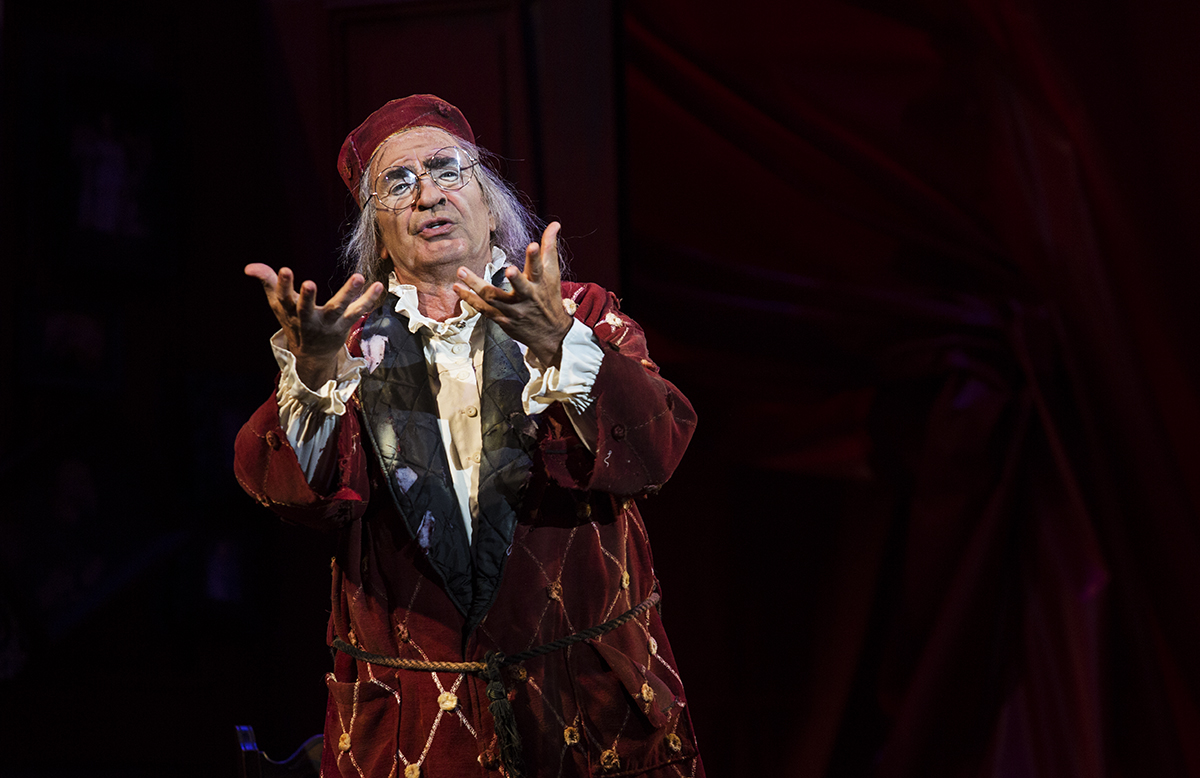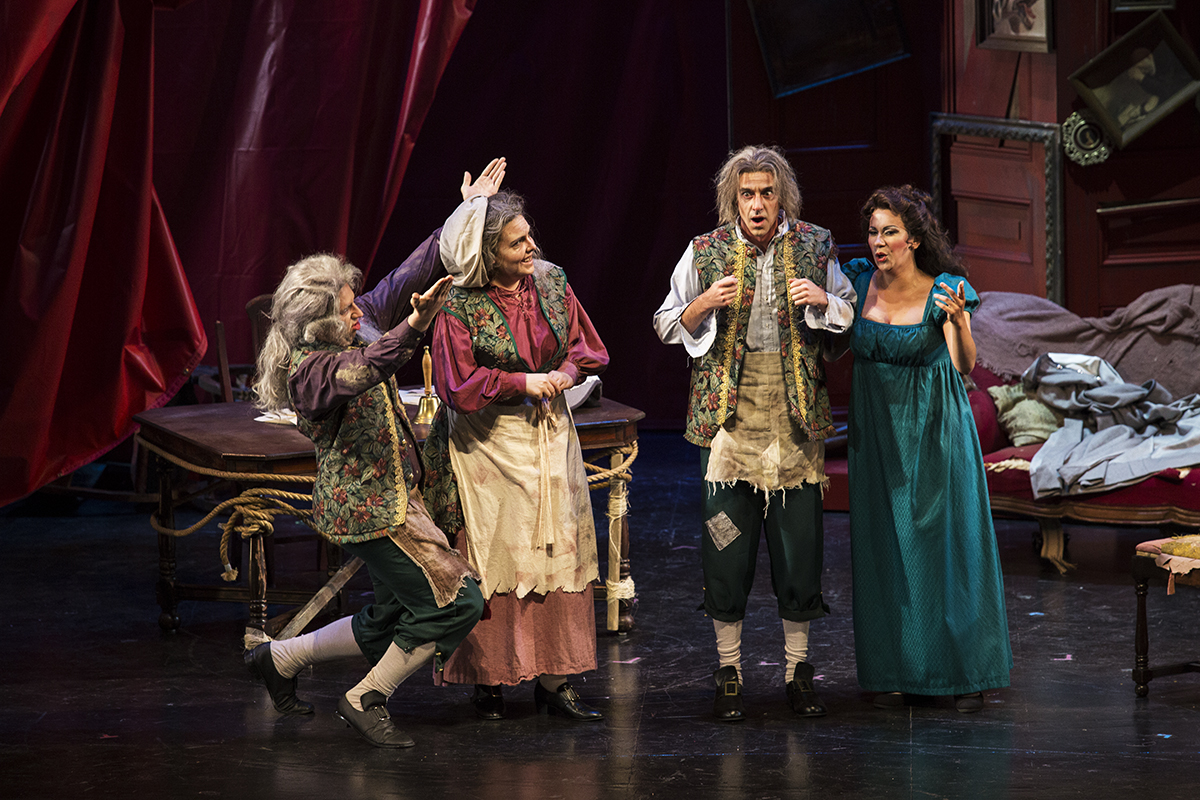Opera’s reputation for blood and thunder is not undeserved. Through much of the 20th century, only a handful of Italian comic works of the 19th century had a place in the repertoire. The Chautauqua Opera Company on Friday made clear in Norton Hall why Don Pasquale has always numbered among the chosen few.
This was a high-spirited interpretation of Donizetti’s already uninhibited score of 1843 — a super-buffo treatment, if you will. If the shtick occasionally got out of hand, the greater part of the stagecraft as overseen by David Schweizer was authentically funny, while conductor Steven Osgood sagely balanced the composer’s lively and lyrical impulses.
There was a good deal of wink-wink-nudge-nudge with the audience, the wily physician Dr. Malatesta having been promoted to a master of ceremonies who directs much of the action (turning lights on and off, for example, with a snap of his fingers). During the overture (at which time we have no reason to equate him with any character in the cast) he performs a kind of solo burlesque act, pulling back successive red curtains which reveal, ironically, nothing but more curtains. He even makes the conductor magically appear in the pit.
Since Malatesta (guest baritone Kyle Pfortmiller in a remarkably multifaceted performance) is indeed the source of the scheme to lure the Don of the title into a union he will sorely regret, there was a certain logic to his exaggerated role. As Schweizer explains in a program note, one objective of the onstage stage direction was to render the theatrical undertaking transparent.
But do we desire this X-ray vision? Suspension of disbelief requires provisional acceptance of what happens within the proscenium as real. And while opera directors for years have been adding stage action to preludes and overtures, I for one believe they were made to be heard, not seen.
None of this prevented this Don Pasquale — set as specified in 19th-century Italy — from having its tonic effect. Chautauqua could hardly have hoped for a better singing actor in the title role than guest artist Stefano de Peppo. This Italian bass-baritone can “buffo” with the best of them but projects a handsome tone. Most importantly, he maintained our interest in the not-altogether-ridiculous plight of an elderly bachelor who wants to marry and still regards himself as spry enough to do so.

Other singers traced a growing arc of confidence as the evening progressed. Norina, the apparently mild-mannered girl from the convent who turns into a termagant after her “marriage” to the Don, is a big role for a Chautauqua Apprentice Artist, but Laura Soto-Bayomi dispatched it with theatrical and technical elan. If her soprano sometimes had an edge, this was not necessarily unsuited to the forceful character.
Arnold Livingston Geis, also a Chautauqua Apprentice Artist, was comparably believable as Ernesto, Don Pasquale’s idealistic nephew (and the real love interest of Norina). I expect his tone to blossom in the repeat performance tonight.
Not that he was presented as a stand-and-deliver tenor: Ernesto’s melancholy farewell to Rome inspired much merriment as he appeared with a backpack and contemporary rolling suitcase from which he pulled out maps and a bathing suit. An amusing approach, to be sure, even if the resulting laughter obscured one of Donizetti’s happiest bel canto inspirations (not to mention its trumpet obbligato). The even more lyrical serenade of Act 3 found Norina ushered in on an ambulatory balcony, a more gently sardonic touch.
Certainly in most sequences the hijinks nicely matched the story and the music. The lively duet of Malatesta and Norina was not only fun in its own right but generated excitement about the trickery to come. The hearty chorus as prepared by Carol Rausch was deftly choreographed in Act 3 when the servants (numerous after Norina’s hiring binge) render comment on the nuttiness of the domestic situation in which they find themselves. Don Pasquale’s ensuing rapid-fire duet with Malatesta came complete with encore, as per tradition.
Baritone Spencer Reichman, a Studio Artist, was our droll notary. Costumes by B.G. FitzGerald were apropos: Soto-Bayomi was a sight to behold in her Act 3 going-out attire. Sets by Caleb Wertenbaker initially made a Scrooge of Don Pasquale, his three servants dressed in tatters and his furniture clearly worse for wear. Norina’s extravagant purchases added to the disarray onstage. The orderly garden of Act 3 came as a great relief, acknowledged by applause.
There was a palpable sense of resolution also in the final ensemble, fully projected but in balance. Osgood led his orchestra of about 35 with panache. Rhythms were zesty where they needed to be. Don Pasquale also has its beauties. These were not neglected.
The audience registered its approval throughout. Both performances are dedicated to the memory of the stage director Bill Fabris, a regular presence at the Chautauqua Opera from 2000 to 2009.
Arthur Kaptainis is the classical music critic for the Montreal Gazette and formerly for the National Post. He also writes for Musical Toronto and Classical Voice North America. Kaptainis is a member of the board of the Music Critics Association of North America.





